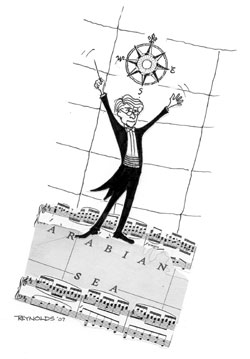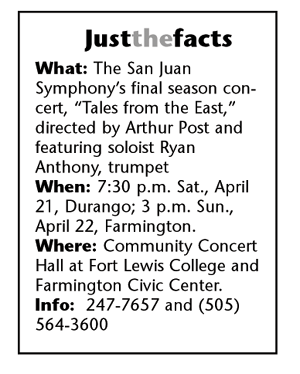|
|
||||
|
Turkish ? and other ? delights
by Judith Reynolds uestion: How long have Westerners fantasized about the East? Answer: A long, long time. The name Marco Polo should give you a clue. From the moment the Italian adventurer trekked to the Far East in the 14th century, we have lived on dreams and clichés of the Orient. So says San Juan Symphony Music Director Arthur Post as he anticipates the next concert in the season. “Tales from the East” is the title Post gave in a recent telephone interview, and the twin concerts Saturday and Sunday, April 21 and 22, in Durango and Farmington, will further explore his overall musical travelogue theme. Post and his musicians will set sail for the final voyage of the 2006-07 season Saturday night in the Community Concert Hall. “Many people love to travel,” Post said, “or dream of traveling. Music evokes the sensations and destinations of travel, so we’ve built our whole season around that idea.” Last fall the “Passport Season” started with a musical trip to Scandinavia featuring a tiny Icelandic giant of the violin, Judith Ingolfsson. In November, “Opera Mondo” made a musical journey to Italy where audience members experienced a full-body immersion in the turgid waters of Puccini, Verdi and Mascagni. The concert ended with a glass of heavy Wagnerian beer followed by a champagne toast. Now Post’s musical travelogue flies on a magic carpet toward the mysterious East. “For a long time, Western society has been intrigued by exotic regions,” Post said, “especially the Near and Far East. Seemingly inhospitable landscapes, inscrutable languages and strange traditions have all inspired a mix of fascination and mistrust, envy and fear. Trade in silk, oil and spices have created opportunities for interaction. Music has been imported, too.” As an example of the influence of Near Eastern music on the West, the orchestra will open the program with Mozart’s “Turkish March.” “Haydn, Mozart and Beethoven all used various techniques to imitate the sounds of the Turkish military bands, especially percussion,” Post said. “The march is an arrangement of the ‘Rondo all Turca’ finale in Mozart’s A Major Piano Sonata.” If you listen carefully, he said, you’ll hear bells and other percussion effects suggestive of sounds from a different, more exotic culture.
If you listen carefully, he said, you’ll hear bells and other percussion effects suggestive of sounds from a different, more exotic culture. Of the five works on the program, Post pointed specifically to Alexander Arutiunian’s Trumpet Concerto. Armenian born, Arutiunian grew up not far from the Iranian border. The 20th century composer studied in Moscow but returned to Armenia to conduct and continue to create music based on folk tunes. “In the virtuoso voice of the trumpet,” Post wrote in the first draft of his program notes, “Eastern European melodies and harmonies can be heard that originated on ordinary folk instruments.” The work was first popularized by the Russian trumpet virtuoso, Timofei Dokshitzer. For 40 years Dokshitzer was principal trumpet of the Bolshoi Theater Orchestra. The San Juan Symphony has invited virtuoso trumpeter Ryan Anthony to be the soloist. A graduate of the Cleveland Institute of Music, Anthony holds bachelor’s and master’s degrees and upon graduation taught trumpet for a time at the Oberlin Conservatory of Music. He also began his association with the famous Canadian Brass. After a number of years performing and recording with the quintet, Anthony left the Brass to pursue a solo career, but he returns regularly to play on their “dream team.” Anthony is a chamber and orchestral musician, most recently acting as principal trumpet with the Dallas Symphony. The Arutiunian concerto may not be familiar, but two shorter works on the program may: Tchaikovsky’s “Neapolitan Dance,” from the “Swan Lake Suite,” and Charles Griffes’ “The Pleasure Dome of Kubla Khan.” Griffes was a promising American composer who died prematurely at 36 in the first quarter of the 20th century. Inspired by Coleridge’s poem of the same title, Griffes composed the “Kubla Khan” work in 1912. It’s filled with colorful imagery – sun-filled palaces and icy caves, the very fantasies on which Western dreams of the mysterious East are made. It’s also a chance for the orchestra to show off its ability “to explore musical color,” Post said. And finally, the concert will feature Aram Khachaturian’s music for the ballet “Spartacus.” Thanks to the 1960 Stanley Kubrick film of the same title, everyone knows the story of the Thracian slave-turned-gladiator, warrior and leader of a rebellion against the Romans. “The subject of slaves rising up against a corrupt state was ideally suited to Soviet esthetics,” Post said of the Cold War era in which the composer worked. Born in Tbilisi, Georgia, Khachaturian found and lost favor with the Soviet regime in an ongoing turbulent relationship not unlike Shostakovich and Prokofiev. When the “Spartacus” score won the Lenin Prize in 1959, Khachaturian was clearly back in favor. “The folk-influenced score is lush, tuneful and wildly rhythmic,” Post noted. “It evokes the decadent luxury of the Romans, the exotic origins of their slaves and the general athleticism of the subject.” In the popular “Adagio of Spartacus and Phyrgia,” listeners may recall that the theme of the slave and his wife found its way into the movies and television. If you’ve seen “Caligula,” Post noted, “The Hudsucker Proxy,” or even a recent children’s cartoon on television, “The Ice Age,” you’ll recognize the theme. Travel on. •
|



